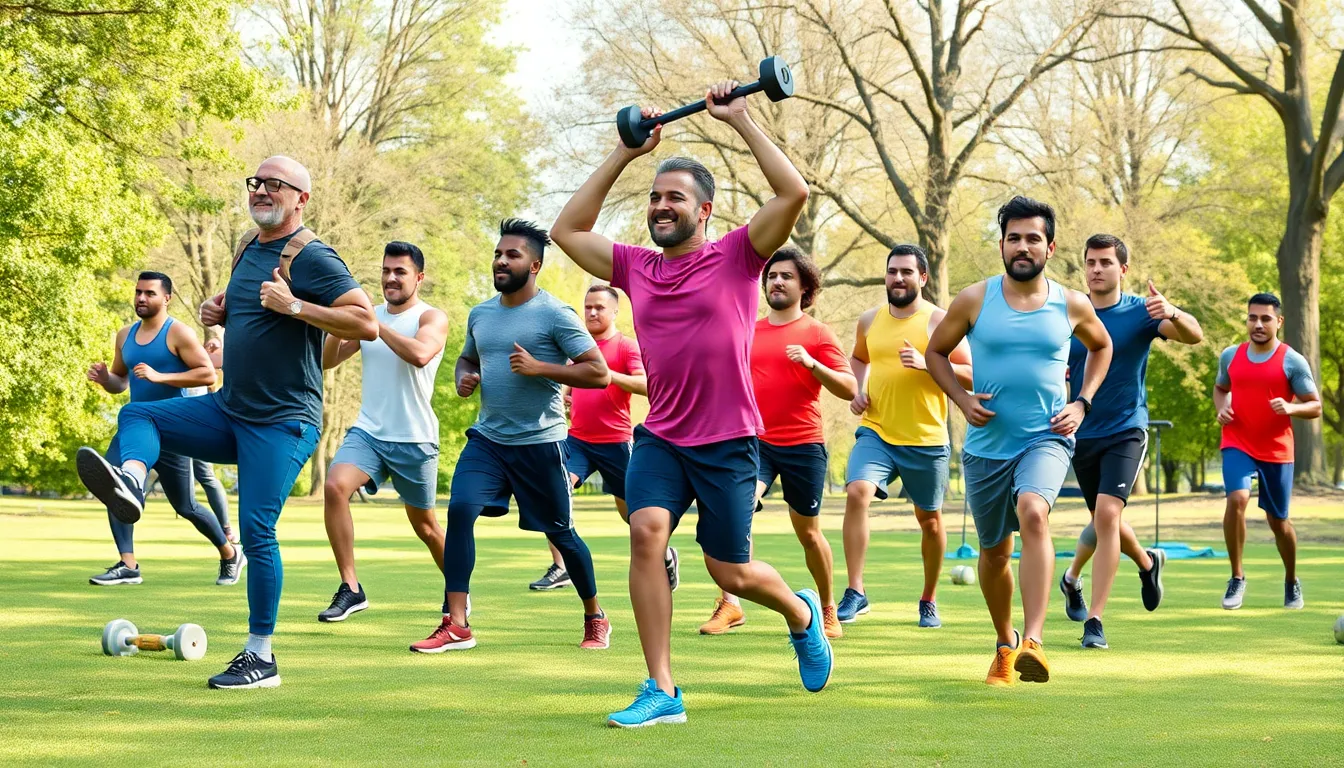In a world where the latest fitness craze seems to change faster than a man can find his car keys, prioritizing wellness can feel like a daunting task. Yet, it’s time for men to step up and take charge of their health without sacrificing their sanity—or their sense of humor. After all, who said wellness had to be all kale smoothies and meditation retreats?
From tackling stress with laughter to embracing the power of a good night’s sleep, wellness for men is about finding balance in a chaotic life. Forget the notion that self-care is just for women; it’s time for men to reclaim their right to feel good. So grab your favorite snack (preferably not a whole pizza) and dive into the essentials of wellness that’ll have them feeling like the best version of themselves—without the need for a superhero cape.
Understanding Wellness for Men
Wellness for men encompasses various dimensions, focusing on physical health, mental health, and emotional well-being. Each aspect plays a crucial role in creating a balanced and fulfilling life.
Physical Health
Regular exercise is vital for maintaining physical health. Engaging in activities, such as strength training, cardio, and flexibility workouts, promotes overall fitness. Nutrition also plays a significant part. Consuming a balanced diet rich in fruits, vegetables, whole grains, and lean proteins boosts energy levels and supports muscle recovery. Men should consider routine medical check-ups, including screenings for cholesterol, blood pressure, and prostate health. Staying hydrated serves an essential purpose too. Optimal hydration regulates bodily functions and enhances performance in daily activities.
Mental Health
Prioritizing mental health matters as much as physical health. Men often encounter stress from various sources, including work or family obligations. Seeking professional support, such as therapy or counseling, provides effective coping strategies. Practicing mindfulness through meditation or yoga reduces anxiety and enhances focus. Additionally, nurturing hobbies—like reading, gardening, or painting—encourages relaxation and cognitive engagement. Maintaining social connections also contributes positively. Engaging with friends or joining community groups fosters a supportive network that promotes mental resilience.
Emotional Well-being
Fostering emotional well-being starts with recognizing and expressing feelings. Men can benefit from discussing emotions openly, whether with friends or professionals. Engaging in activities that spark joy, such as traveling or exploring new interests, contributes positively to emotional health. Practicing gratitude can also help; reflecting on positive experiences enhances overall satisfaction. Setting achievable goals positions men for success and boosts self-esteem. Ultimately, balancing various life aspects—career, relationships, and hobbies—further enriches emotional health.
The Importance of Physical Activity

Physical activity serves as a cornerstone of wellness for men. Its inclusion in daily routines leads to significant health improvements.
Types of Exercise
Aerobic activities like running and cycling enhance cardiovascular health. Strength training using weights promotes muscle growth. Flexibility exercises such as yoga improve overall mobility. High-intensity interval training (HIIT) provides efficient fat-burning benefits. Additionally, recreational sports offer social interaction while staying active. Each type contributes uniquely to physical fitness, making variety essential for a well-rounded exercise regimen.
Benefits of Regular Exercise
Regular exercise lowers the risk of chronic diseases such as heart disease, diabetes, and obesity. Enhanced mental health often follows physical activity, as it reduces symptoms of anxiety and depression. Improved sleep quality can result from consistent exercise, leading to greater daytime energy. Weight management becomes more manageable through increased physical activity, supporting overall well-being. Furthermore, exercise boosts self-esteem and confidence, enabling men to face daily challenges with resilience. Each benefit reinforces the significance of staying active for optimal health outcomes.
Nutrition and Wellness
Nutrition plays a vital role in overall wellness for men. A balanced diet fuels the body and supports mental clarity, emotional stability, and physical vitality.
Essential Nutrients for Men
Men benefit from specific nutrients that enhance health. Protein sources, like lean meats, fish, beans, and nuts, support muscle growth and repair. Omega-3 fatty acids found in fatty fish improve heart health and cognitive function. Vitamins A, C, and E boost immune health and skin maintenance. Additionally, minerals such as zinc and magnesium promote reproductive health and aid in muscle recovery. Whole grains offer fiber and essential B vitamins, fueling energy levels throughout the day. Prioritizing these nutrients creates a strong foundation for physical fitness and mental well-being.
Meal Planning Tips
Effective meal planning simplifies healthy eating. Start by creating a weekly menu that incorporates diverse, nutrient-rich foods. Preparing meals in advance helps reduce the temptation of unhealthy snacks. Include plenty of vegetables, whole grains, and lean proteins in lunch and dinner options. Keeping portion sizes in check prevents overeating and supports weight management. Snack options, such as fruits, nuts, and yogurt, provide energy without excessive calories. Utilize shopping lists to stick to healthy choices, ensuring nutritious selections. By establishing a structured approach to meals, men foster better dietary habits that contribute to long-term wellness.
Mental Health Awareness
Mental health awareness plays a crucial role in overall wellness for men. Recognizing and addressing mental health challenges can significantly improve quality of life.
Recognizing Stress and Anxiety
Stress and anxiety often manifest differently in men than in women. Symptoms can include irritability, fatigue, or difficulty concentrating. Sometimes, men may express stress through anger or withdrawal rather than talking about their feelings. Regularly assessing emotional state can help identify these symptoms early. Engaging in mindfulness practices like meditation or deep-breathing exercises empowers men to manage stress proactively. Acknowledging problems as they arise promotes a healthier mindset.
Resources for Support
Support resources for men’s mental health come in various forms, including counseling and peer support groups. Professional therapy offers men an opportunity to address concerns in a safe, confidential environment. Many organizations provide hotlines and online therapy options that are accessible. Connecting with supportive friends or family can bolster emotional resilience. Moreover, community wellness programs frequently offer workshops focused on mental health awareness and coping strategies.
Utilizing these resources ensures men receive the support they need to navigate their mental health challenges effectively.
Building Healthy Relationships
Building healthy relationships significantly contributes to overall wellness for men. Strong connections with others enhance emotional stability and promote mental health.
The Role of Communication
Effective communication fosters trust and understanding in relationships. Expressing feelings clearly strengthens bonds and encourages emotional openness. Listening actively helps partners feel valued and respected. Misunderstandings often arise from a lack of communication, leading to unnecessary conflicts. Regularly checking in with friends or partners creates an atmosphere of support and care. Sharing thoughts can reduce feelings of isolation and enhance connection.
Importance of Male Friendships
Male friendships play a crucial role in emotional health. Engaging socially helps combat loneliness and provides a sense of belonging. Shared activities, like sports or hobbies, create opportunities for deeper connections. Friends often offer unique perspectives, which can assist in navigating life’s challenges. Supportive friendships built on mutual respect encourage men to express their feelings. Maintaining these bonds promotes happiness and resilience, enhancing overall wellness.
Wellness for men is about embracing a holistic approach to health and happiness. By prioritizing physical fitness mental clarity and emotional connection men can navigate life’s challenges with greater ease. It’s crucial to break free from stereotypes and recognize that self-care is not just for women.
Engaging in regular exercise maintaining a balanced diet and nurturing mental health are all vital components of a fulfilling life. Building strong relationships and practicing gratitude can enhance emotional well-being.
Ultimately men can thrive by integrating these wellness strategies into their daily routines. Taking charge of their well-being not only benefits them but also enriches the lives of those around them.













